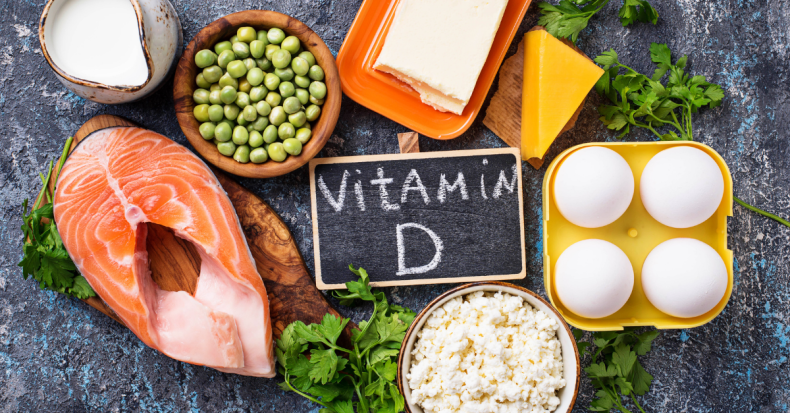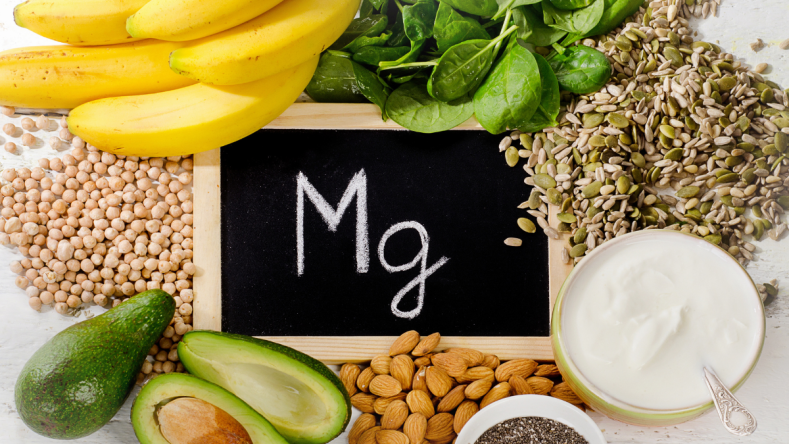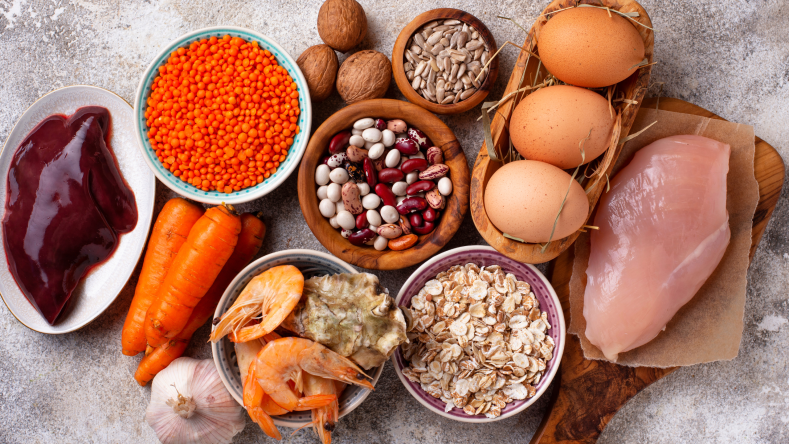The 7 best minerals and vitamins for digestion, according to science
Studies suggest that the gut microbiome plays a role in digestive health and inflammation, but what nutrition action items can you take to keep your gut happy? From omega-3s to zinc, here are the best minerals and vitamins for digestion.

Over the last decade, gut health has continued to gain widespread attention for its impact on inflammatory markers and digestive health. And since digestion helps to break down food into nutrients for energy, growth, and cell repair, it’s important to ensure your system is in tip-top shape through nutrition and lifestyle choices.
However, research suggests that certain supplements can also help with digestion. But which ones are worth taking, or could they do your digestive system more harm than good?
In this article, we are diving into the science to see which supplements you may want to consider adding to your daily routine for better digestive health. From omega-3s to zinc, here are the best minerals and vitamins for digestion.

Get the right vitamins for digestion with Elo Smart Gummies
Elo Smart Gummies
Elo Smart Gummies deliver essential vitamins and minerals and incorporate health-boosting functional ingredients (such as vitamin D, iron and vitamin B12) for digestion to help simplify and streamline your daily supplementation routine. They are also vegan, allergen-free, and added sugar-free.

Vitamin B12
Vitamin B12 1 2
Emerging studies also indicate that vitamin B12 can play a role in digestion, as it’s been found that B12 can support digestive enzyme production and help foster healthy gut bacteria [ 3 4
Dosing recommendations
The recommended daily intake of vitamin B12 varies depending on age and life stage, but the specific recommended intakes are as follows [ 1
Adult men and women: 2.4 mcg/day
Pregnancy: 2.6 mcg/day
Lactation: 2.8 mcg/day
Precautions
Vitamin B12 supplementation is considered safe and has no Tolerable Upper Intake Level (UL) due to its low level of toxicity [ 1 1 5

Vitamin C
Also known as L-ascorbic acid, vitamin C 6
While this vitamin is often the poster child for immunity, research shows that it could do more for your health than stave off the common cold. Research shows that vitamin C is strongly associated with gut health and digestion, as it can help maintain balance in your gut microbiome, improve digestion, inhibit bacterial growth, and bolster gut barrier function [ 7 8 9
Experts have also found that vitamin C may play a potential role in preventing certain cancers of the digestive system, but more research is needed in this area [ 10
Dosing recommendations
The recommended daily amount (RDA) for adults is as follows [ 6
Men and women 9–13 years old: 45 mg/day
Men 14-18 years old: 75 mg/day
Women 14-18 years old: 65 mg/day, with this number increasing to 80 mg/day and 115 mg/day for pregnant and lactating women, respectively.
Men over 19 years old: 90 mg/day
Women over 19 years old: 75 mg/day, with this number increasing to 85 mg/day and 120 mg/day for pregnant and lactating women, respectively.
People who smoke: an additional 35 mg/day than nonsmokers.
Precautions
Vitamin C is generally well tolerated, but it may cause diarrhea, nausea, cramps, and other GI disturbances if taken at higher doses. Excess vitamin C might also cause excess iron consumption and could exacerbate iron overload in people who have hemochromatosis [ 6

Vitamin D
Vitamin D 11 12 13
Did you know that 54% of newly enrolled Elo members exhibit low vitamin D levels? Here's how Smart Gummies can help.
Dosing recommendations
For vitamin D, the recommended daily allowance for both men and women 19-70 years old is 600 - 800 IU, but some evidence suggests that 2,000+ IU may be helpful for certain people [ 14
Precautions
When consumed in excess, vitamin D can cause toxicity by way of hypercalcemia, which can lead to nausea, vomiting, muscle weakness, loss of appetite, dehydration, polyuria, excessive thirst, and kidney stones [ 14

Iron
Iron 15 16 17
Interestingly, studies indicate that iron deficiency anemia is associated with liver disorders and gastrointestinal conditions, like IBS, and can cause fatigue, weakness, and uncomfortable digestive symptoms (such as abdominal pain, constipation, and diarrhea) [ 18 19
Dosing recommendations
The RDA for iron greatly varies between age, gender, and pregnancy [ 15
Women 19 to 50 years old: 18 mg
Women 51 years old and above: 8 mg
Pregnant and lactating women: 27 mg and 9 mg, respectively
Men and non-menstruating women: 8 mg
Vegetarians: 1.8 times the RDA to compensate for reduced iron bioavailability and absorption [
20
].
Keep in mind that your personal needs may differ, especially if you have a condition that impairs iron absorption (like celiac disease or Crohn’s disease), or hemochromatosis [ 21
Precautions
Even though iron is an essential mineral, it can do more harm than good if it’s not taken properly. Studies show that excess iron intake (>45 mg/day) can lead to iron toxicity, elevated ferritin levels, and a damaged GI system and may result in negative side effects like nausea, vomiting, diarrhea, and stomach pain. It can also accumulate in your organs over time and cause fatal damage to the liver or brain [ 22 23

Magnesium
Magnesium plays many critical roles in the body, including protein synthesis, bone health, energy production, disease prevention, and heart, muscle, and nerve function [ 24 25 26 27
Research also shows that magnesium plays a role in digestive health, as it can act as a laxative by drawing water into the intestines to stimulate bowel motion, and help with stool softness and size [ 28
Dosing recommendations
Magnesium needs vary by age and gender, as shown by the following [ 24
Males 14-18 years: 410 mg/day
Males 19–30 years: 400 mg/day
Males 31+ years: 420 mg/day
Females 14-18 years: 360 mg/day (400 mg/day during pregnancy)
Females 19–30 years: 310 mg/day (350 mg/day during pregnancy)
Females 31+ years: 320 mg/day (360 mg/day during pregnancy)
Precautions
Magnesium supplementation isn’t right for everyone, as supplements may interact with certain medicines (including diuretics, heart medicines, and some antibiotics) and could cause negative issues if you have diabetes, or kidney, heart, or intestinal disease [ 29

Omega-3
Omega-3 fatty acids
While these fatty acids are incredibly beneficial for overall health, studies also show that omega-3s play a role in digestion, as they can improve gut biodiversity and increase healthy bacteria within the gut [ 30 30
Dosing recommendations
The daily recommendation for all omega-3s is 1,600 mg/day for men and 1,100 mg/day for women [ 31
Precautions
If you have high triglycerides, it may be best to avoid omega-3 supplements, as they have been associated with an increased likelihood of developing atrial fibrillation [ 32

Zinc
Zinc 33 34
Dosing recommendations
The RDA for zinc is as follows [ 33
Men over 14 years old: 11 mg/day
Women 14-18 years old: 9 mg/day (12 mg/day and 13 mg/day for breastfeeding and lactation, respectively)
Women over 19 years old: 8 mg/day (11 mg/day and 12 mg/day for breastfeeding and lactation, respectively)
Precautions
While zinc supplements are usually well-tolerated, they can cause nausea, vomiting, diarrhea, and stomach pain in some people, along with coughing, headache, and fever in those taking more than 40 mg/day [ 35 33
Summary
Digestion plays a large role in your overall health, as it helps to break down food into nutrients to be used for energy, growth, and cell repair. By keeping your digestive system in tip-top shape, you can also bolster your gut health and even prevent a variety of health concerns.
You can improve gut and digestive health with certain lifestyle and dietary changes. Still, some supplements like vitamin B12, vitamin C, vitamin D, iron, magnesium, omega-3 fatty acids, and zinc may also support a healthy gut, improve digestion, and keep you regular.
If you’re confused about which supplements are right for you, Elo Health
Disclaimer: The text, images, videos, and other media on this page are provided for informational purposes only and are not intended to treat, diagnose or replace personalized medical care.
Key takeaways
Digestion helps to break down food into nutrients, which the body uses for energy, growth, and cell repair.
Studies show that the gut microbiome plays a role in digestive health and inflammatory markers.
Some of the best vitamins for digestion include vitamin B12, vitamin C, vitamin D, iron, magnesium, omega-3 fatty acids, and zinc.
Elo Health can determine the right supplements for you with
Smart Gummies
–personalized, 7-layer daily gummy supplements that are 3D-printed to match your unique needs based on your health goals, dietary preferences, and biomarkers.
References
U.S. Department of Health and Human Services. (n.d.). Office of dietary supplements - vitamin B12. NIH Office of Dietary Supplements.
https://ods.od.nih.gov/factsheets/VitaminB12-HealthProfessional/
Daniel K. Hall-Flavin, M. D. (2018, June 1). Vitamin B-12 and depression: Are they related?. Mayo Clinic.
https://www.mayoclinic.org/diseases-conditions/depression/expert-answers/vitamin-b12-and-depression/faq-20058077
Wan, Z., Zheng, J., Zhu, Z., Sang, L., Zhu, J., Luo, S., Zhao, Y., Wang, R., Zhang, Y., Hao, K., Chen, L., Du, J., Kan, J., & He, H. (2022). Intermediate role of gut microbiota in vitamin B nutrition and its influences on human health. Frontiers in Nutrition, 9.
https://doi.org/10.3389/fnut.2022.1031502
Pan, Y., Liu, Y., Guo, H., Jabir, M. S., Liu, X., Cui, W., & Li, D. (2017). Associations between Folate and Vitamin B12 Levels and Inflammatory Bowel Disease: A Meta-Analysis. Nutrients, 9(4), 382.
https://doi.org/10.3390/nu9040382
Mayo Foundation for Medical Education and Research. (2023, August 10). Vitamin B-12. Mayo Clinic.
https://www.mayoclinic.org/drugs-supplements-vitamin-b12/art-20363663
U.S. Department of Health and Human Services. (n.d.-b). Office of dietary supplements - vitamin C. NIH Office of Dietary Supplements.
https://ods.od.nih.gov/factsheets/VitaminC-HealthProfessional/
Pham, V. T., Fehlbaum, S., Seifert, N., Richard, N., Bruins, M. J., Sybesma, W., Rehman, A., & Steinert, R. E. (2021). Effects of colon-targeted vitamins on the composition and metabolic activity of the Human Gut Microbiome– a pilot study. Gut Microbes, 13(1).
https://doi.org/10.1080/19490976.2021.1875774
Traber, M. G., Buettner, G. R., & Bruno, R. S. (2019). The relationship between vitamin C status, the gut-liver axis, and metabolic syndrome. Redox biology, 21, 101091.
https://doi.org/10.1016/j.redox.2018.101091
Otten, A. T., Bourgonje, A. R., Peters, V., Alizadeh, B. Z., Dijkstra, G., & Harmsen, H. J. M. (2021). Vitamin C Supplementation in Healthy Individuals Leads to Shifts of Bacterial Populations in the Gut-A Pilot Study. Antioxidants (Basel, Switzerland), 10(8), 1278.
https://doi.org/10.3390/antiox10081278
Larsson, S. C., Mason, A. M., Vithayathil, M., Carter, P., Kar, S., Zheng, J.-S., & Burgess, S. (2022). Circulating vitamin C and digestive system cancers: Mendelian randomization study. Clinical Nutrition, 41(9), 2031–2035.
https://doi.org/10.1016/j.clnu.2022.07.040
Mayo Foundation for Medical Education and Research. (2023b, August 10). Vitamin D. Mayo Clinic.
https://www.mayoclinic.org/drugs-supplements-vitamin-d/art-20363792
Tabatabaeizadeh, S. A., Tafazoli, N., Ferns, G. A., Avan, A., & Ghayour-Mobarhan, M. (2018). Vitamin D, the gut microbiome and inflammatory bowel disease. Journal of research in medical sciences : the official journal of Isfahan University of Medical Sciences, 23, 75.
https://doi.org/10.4103/jrms.JRMS_606_17
Boughanem, H., Canudas, S., Hernandez-Alonso, P., Becerra-Tomás, N., Babio, N., Salas-Salvadó, J., & Macias-Gonzalez, M. (2021). Vitamin D Intake and the Risk of Colorectal Cancer: An Updated Meta-Analysis and Systematic Review of Case-Control and Prospective Cohort Studies. Cancers, 13(11), 2814.
https://doi.org/10.3390/cancers13112814
U.S. Department of Health and Human Services. (n.d.). Office of dietary supplements - vitamin D. NIH Office of Dietary Supplements.
https://ods.od.nih.gov/factsheets/VitaminD-HealthProfessional/
U.S. Department of Health and Human Services. (n.d.-a). Office of dietary supplements - iron. NIH Office of Dietary Supplements.
https://ods.od.nih.gov/factsheets/iron-healthprofessional/
Pregnancy and birth: Do all pregnant women need to take iron.
https://www.ncbi.nlm.nih.gov/books/NBK279574/
Kapoor, M. P., Sugita, M., Kawaguchi, M., Timm, D., Kawamura, A., Abe, A., & Okubo, T. (2023). Influence of iron supplementation on fatigue, mood states and sweating profiles of healthy non-anemic athletes during a training exercise: A double-blind, randomized, placebo-controlled, parallel-group study. Contemporary clinical trials communications, 32, 101084.
https://doi.org/10.1016/j.conctc.2023.101084
Stein, J., Connor, S., Virgin, G., Ong, D. E., & Pereyra, L. (2016). Anemia and iron deficiency in gastrointestinal and liver conditions. World Journal of Gastroenterology, 22(35), 7908.
https://doi.org/10.3748/wjg.v22.i35.7908
Gastroenterology, 1. (n.d.). High prevalence of subclinical iron deficiency in patients... : Official Journal of the American College of Gastroenterology: ACG. LWW.
https://journals.lww.com/ajg/Fulltext/2014/10002/High_Prevalence_of_Subclinical_Iron_Deficiency_in.1829.aspx
Dietary iron - statpearls - NCBI bookshelf. (n.d.).
https://www.ncbi.nlm.nih.gov/books/NBK540969/
Saboor, M., Zehra, A., Qamar, K., & Moinuddin (2015). Disorders associated with malabsorption of iron: A critical review. Pakistan journal of medical sciences, 31(6), 1549–1553.
https://doi.org/10.12669/pjms.316.8125
Iron overload - statpearls - NCBI bookshelf. (n.d.).
https://www.ncbi.nlm.nih.gov/books/NBK526131/
Rusu, I. G., Suharoschi, R., Vodnar, D. C., Pop, C. R., Socaci, S. A., Vulturar, R., Istrati, M., Moroșan, I., Fărcaș, A. C., Kerezsi, A. D., Mureșan, C. I., & Pop, O. L. (2020). Iron Supplementation Influence on the Gut Microbiota and Probiotic Intake Effect in Iron Deficiency-A Literature-Based Review. Nutrients, 12(7), 1993.
https://doi.org/10.3390/nu12071993
U.S. Department of Health and Human Services. (n.d.). Office of dietary supplements - magnesium. NIH Office of Dietary Supplements.
https://ods.od.nih.gov/factsheets/Magnesium-HealthProfessional/
de Baaij, J. H., Hoenderop, J. G., & Bindels, R. J. (2015). Magnesium in man: Implications for health and disease. Physiological Reviews, 95(1), 1–46.
https://doi.org/10.1152/physrev.00012.2014
Schwalfenberg, G. K., & Genuis, S. J. (2017). The importance of magnesium in clinical healthcare. Scientifica, 2017, 1–14.
https://doi.org/10.1155/2017/4179326
Volpe, S. L. (2015). Magnesium and the athlete. Current Sports Medicine Reports, 14(4), 279–283.
https://doi.org/10.1249/jsr.0000000000000178
Barbara Bolen, P. (2023, October 16). The benefits of magnesium. Verywell Health.
https://www.verywellhealth.com/magnesium-for-constipation-and-ibsc-1944780
WebMD. (n.d.). Magnesium: Overview, uses, side effects, precautions, interactions, dosing and reviews. WebMD.
https://www.webmd.com/vitamins/ai/ingredientmono-998/magnesium
Menni, C., Zierer, J., Pallister, T., Jackson, M. A., Long, T., Mohney, R. P., Steves, C. J., Spector, T. D., & Valdes, A. M. (2017). Omega-3 fatty acids correlate with gut microbiome diversity and production of N-carbamylglutamate in middle aged and elderly women. Scientific Reports, 7(1).
https://doi.org/10.1038/s41598-017-10382-2
U.S. Department of Health and Human Services. (n.d.). Office of dietary supplements - omega-3 fatty acids. NIH Office of Dietary Supplements.
https://ods.od.nih.gov/factsheets/Omega3FattyAcids-HealthProfessional/
Huh, J. H., & Jo, S. H. (2023). Omega-3 fatty acids and atrial fibrillation. The Korean journal of internal medicine, 38(3), 282–289.
https://doi.org/10.3904/kjim.2022.266
U.S. Department of Health and Human Services. (n.d.). Office of dietary supplements - zinc. NIH Office of Dietary Supplements.
https://ods.od.nih.gov/factsheets/Zinc-HealthProfessional/
�Scarpellini, E., Balsiger, L. M., Maurizi, V., Rinninella, E., Gasbarrini, A., Giostra, N., Santori, P., Abenavoli, L., & Rasetti, C. (2022). Zinc and gut microbiota in health and gastrointestinal disease under the COVID-19 suggestion. BioFactors (Oxford, England), 48(2), 294–306.
https://doi.org/10.1002/biof.1829
Zinc - StatPearls - NCBI Bookshelf. (n.d.).
https://www.ncbi.nlm.nih.gov/books/NBK547698/







